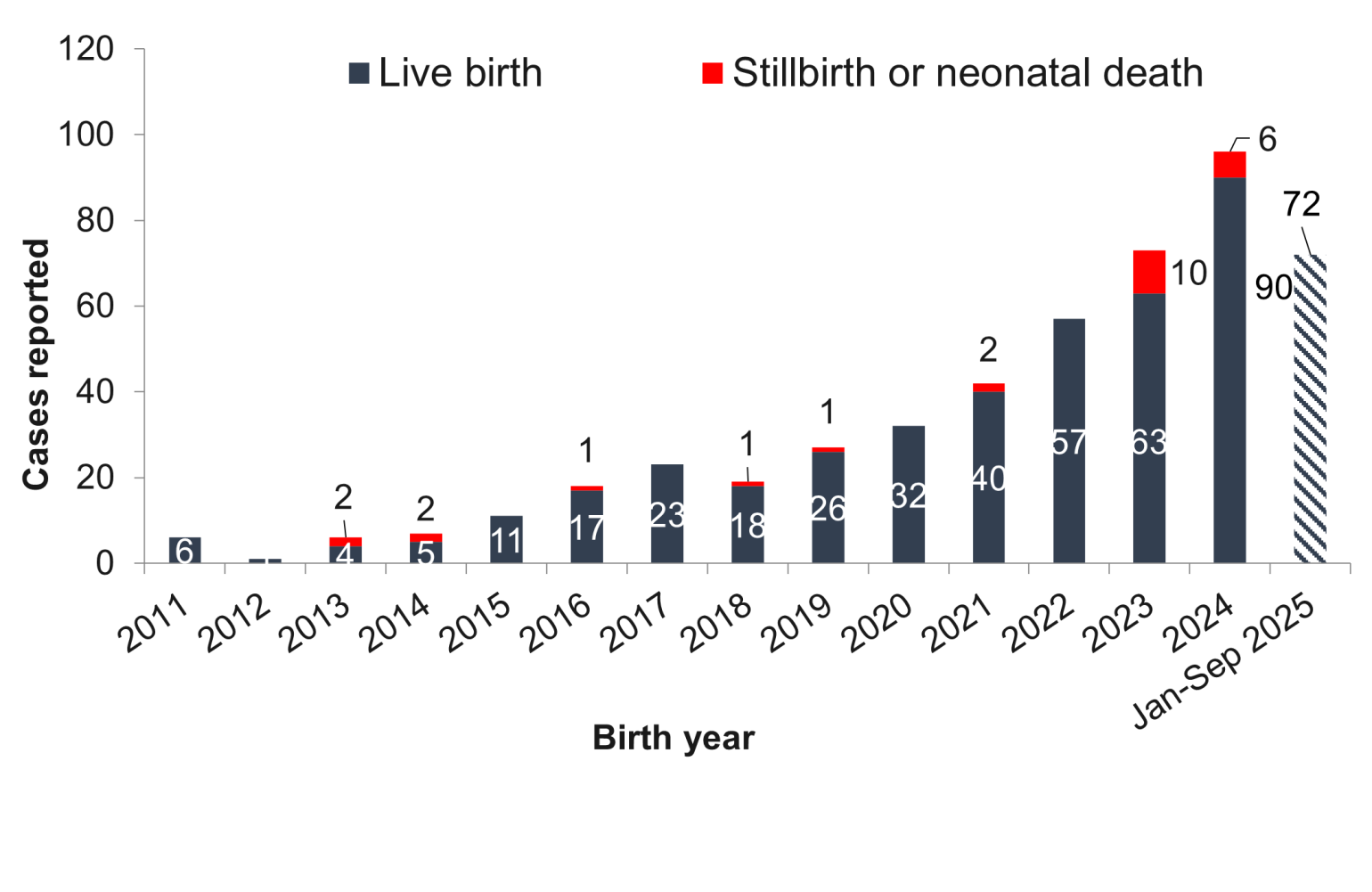Cases are Rising
Syphilis infections are on the rise in North Carolina. Syphilis can affect anyone, but is currently rising in women and men who have sex with women. This has led to an alarming increase in cases of congenital syphilis.
NCDHHS is working to improve access to syphilis testing, as well as community awareness about this growing epidemic, so that more people can have access to information and treatment.
On this page
Increase in congenital syphilis cases
From 2023 to 2024

2024 data is preliminary and may be incomplete.
More North Carolina Syphilis Data
News Releases and Memos
News Release (2/21/24): North Carolina Leads the Way in Expanding Access to Treatment for Syphilis
News Release (12/15/23): North Carolina Joins Southeastern States in Partnership to Combat the Surge in Congenital Syphilis Infections
Provider Memo (11/9/23): Continued Rise in Female and Congenital Syphilis Infections
Your Role as a Provider
As a clinician, you play an important role in preventing syphilis and congenital syphilis. Here's how you can do your part:
- Know the signs and symptoms so you can identity syphilis infections. See examples of signs of syphilis.
- Complete a sexual health history for all your patients.
- Test sexually active MSM, including those with HIV infection, at least annually, and as frequently as every 3 to 6 months if there are multiple sex partners or substance use.
- Test all pregnant women at the first prenatal visit, between 28-30 weeks gestation, and at delivery (this is required by NC state law), and know the mother’s delivery test results before discharging the newborn.
- Treat patients with syphilis immediately and per the CDC STI treatment guidelines. If you do not have access to benzathine penicillin, contact your local health department immediately.
- Advise your patients to notify all sex partners of their exposure to prevent re-infection. People can anonymously notify sex partners using TellYourPartner.org.
- Immediately report syphilis and congenital syphilis infections to Public Health.
Information Specific to Congenital Syphilis
Congenital syphilis is preventable by early detection and rapid treatment of the mother's infection. All pregnant women should be screened at least three times during pregnancy, irrespective of clinical signs (syphilis can be asymptomatic) or perceived risk.
Screenings Required By Law
North Carolina public health law requires healthcare providers screen all pregnant women for syphilis:
- at the first prenatal visit, and
- between 28-30 weeks’ gestation, and
- at delivery.
North Carolina Case Review Findings
Findings from a review of congenital syphilis cases in North Carolina from 2016 to 2022 indicate infants end up with congenital syphilis when:
- There is no or late entry of pregnant women into prenatal care.
- There was prenatal care but incomplete syphilis testing during pregnancy.
- Mother received delayed, no, or inadequate treatment for her stage of syphilis infection.
- The exposed newborn was not appropriately evaluated or treated at birth for congenital syphilis.

Materials to Share
Find social media graphics, brochures, flyers, posters, rack cards and more:
Links to Other Resources
- Compassionate Conversations: Screening for Syphilis During Pregnancy
- What Health Care Providers Can Do (CDC)
- Reducing Syphilis Rates: A Healthcare Provider's Role (CDC)
- Syphilis Pocket Guide (CDC)
- Free Materials About Syphilis and Congenital Syphilis to Print and Share
- CDC - Syphilis Images
- National STD Clinical Consultation Network
- Regional Offices for HIV/Syphilis Contact Tracers
- 1-833-TLC-MAMA Hotline Partner Toolkit
- NC Maternal Mental Health Matters
- Taking an Inclusive Sexual History
- The Diagnosis and Management of Syphilis: An Update and Review, March 2019 (NYC Department of Health and NYC STD Prevention Training Center)
- Syphilis Testing Tips for Providers (Oregon Health Authority)
- STI Screening Recommendations
- Sexual Health Questions to Ask All Patients (National Coalition for Sexual Health)
- Syphilis and Drug User Health webinar series
- Syphilis Rapid Testing Algorithm
- HIV/STD Testing and Prevention
- Free STD Test Locator
- Medicaid Expansion Information
- How to Apply for Medicaid
- NC Medicaid Family Planning/Be Smart Program
- Extension of NC Medicaid Postpartum Health Care Coverage
- Preventive Care Benefits for Women (healthcare.gov)
- Perinatal Services (Alcohol/Drug Council of North Carolina)
- North Carolina Pregnancy & Opioid Exposure Project
- NC Drug User Health Resource Guide
- National Maternal Mental Health Hotline
